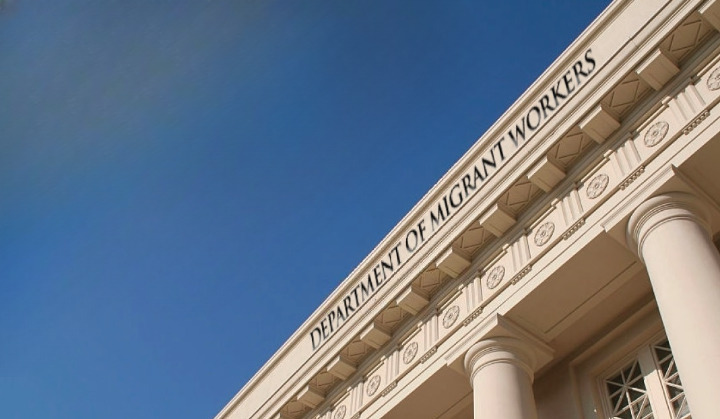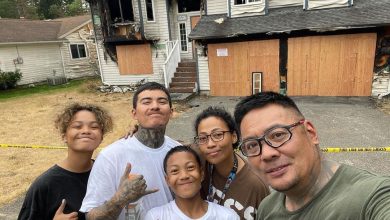Overseas Filipino workers (OFWs) will soon have a dedicated department in the Philippine government that rounds up all services scattered across different government agencies in a one-stop shop.
President Rodrigo Duterte signed Republic Act 11641, otherwise known as “An Act creating the Department of Migrant Workers” (DMW) fulfilling one of his priority bills during his past State of the Nation Addresses to assure the safe migration of Filipinos all over the world, promote the protection of their rights, and help Filipinos reintegrate back to society once they have finished their contracts and decide to return home for good.
“The establishment of the Department of Migrant Workers happens on the celebration of Rizal day, when we honor not only the exceptional love of the country of Dr. Jose Rizal but also the patriotism, excellence, courage of our modern-day heroes, including our overseas Filipinos,” said Duterte during his speech when he signed the bill into law during the 125th celebration of Dr. Jose Rizal’s martyrdom last December 30, 2021.
In the past, OFWs had to visit either the embassy, consulate or the Philippine Overseas Labor Office (POLO), for a variety of labor-related concerns. Soon, all of the POLOs will be converted into Migrant Workers Offices (MWOs) to help simplify and streamline all processes.
Here are the most notable changes, as well as the new benefits that this brings for OFWs.
“No person shall be appointed as Secretary, Undersecretary, or Assistant Secretary of the Department unless he is a citizen and resident of the Philippines, of good moral character, of proven integrity and competence in public administration, and has recognized expertise in governance involving, and/or experience as, OFWs.”
1. One stop shop
The current Philippine Overseas Employment Administration (POEA) will act as the head department of the newly-formed DMW.
Several other offices such as the Department of Labor and Employment’s International Labor Affairs Bureau and all Overseas Labor Offices, the National Reintegration Center for OFWs, and the National Maritime Polytechnic.
In addition, the Commission on Filipino Overseas under the Office of the President, the Department of Foreign Affairs’ Office of the Undersecretary for Migrant Workers Affairs (OUMWA) and the Department of Social Welfare and Development’s Office of the Social Welfare Attaché (OSWA) and International Social Services Office, will also be merged with the DMW. The Overseas Workers Welfare Administration (OWWA) will remain as an attached agency of the new department.
2. Competent leaders
One of the highlights of this new law is that all Secretaries, Undersecretaries, and Assistant Secretaries would have to have either an experience as an OFW or have a recognized expertise in governance involving migrant workers.
Section 10 of R.A. 11641 that outlines qualifications for the department’s leadership reads: “No person shall be appointed as Secretary, Undersecretary, or Assistant Secretary of the Department unless he is a citizen and resident of the Philippines, of good moral character, of proven integrity and competence in public administration, and has recognized expertise in governance involving, and/or experience as, OFWs.”
It also highlighted that individuals who are actively involved in the business of recruitment and deployment of OFWs will not be allowed to take any leadership posts in the said department. This prohibition extends to relatives of these business owners up to the fourth degree of consanguinity or affinity, to avoid any possible conflicts of interest.
3. Regulating overseas recruitment
One of the primary functions of the DMW is to regulate local recruitment agencies and investigate anomalies relating to human trafficking, in cooperation with the Department of Justice (DOJ) and the Inter-Agency Council Against Trafficking (IACAT).
Victims of trafficking in persons or illegal recruitment as well as OFWs who have experienced unpaid salaries, abuse from employer, rape or sexual abuse, maltreatment and other forms of physical or mental abuse may now all convey their concerns through this new agency without having to switch to and from POLO and the Embassy/Consulate as is the practice today.
For its part, the DMW will help prosecute individuals and companies and issue subpoenas to any person for investigation who are found to liable of abuse and illegal recruitment of Filipinos. These individuals, as well as local and foreign recruitment agencies, their agents, and employers, who are found guilty of human trafficking, will be included in a blacklist that will be created by the new department.
This database will be shared within the concerned agencies of the Department and with the IACAT. The DMW shall also establish a monitoring system for cases involving trafficking and illegal recruitment of OFWs.
4. AKSYON Fund
The DMW law will also witness the establishment of the Agarang Kalinga at Saklolo para sa mga OFW na Nangangailangan (AKSYON) Fund intended to provide financial assistance to migrant workers for legal and other related matters.
This includes the repatriation of distressed OFWs and their families, including shipment of remains and personal belongings. At present, DFA’s embassy and consulate and DOLE’s POLO-OWWA have separate initiatives and respective budgets intended for repatriation and financial assistance for OFWs’ legal issues. The AKSYON fund will soon consolidate both of these budgets into one.
This new fund will be separate and distinct from the Assistance to Nationals Fund as well as the Legal Assistance Fund of DFA intended for other migrant Filipinos not covered by this law.
5. New 24/7 Help Center
The Act also provides for the creation of a 24/7 Emergency Response and Action Center Unit. This includes both media and a social media monitoring center to respond to the emergency needs of OFWs.
In the UAE for instance, the embassy, consulate and POLO-OWWAs have 24/7 hotlines via WhatsApp. While the law did not specify which social media platform that the DMW will be using, OFWs may soon reach out to a new centralized DMW help center for their respective concerns.
In addition, the DMW will also launch a new Management Information System which will serve as the registry of all migrant workers.
6. Mandatory Insurance
All local recruitment agencies will now be mandated to provide insurance for all Filipinos who will be leaving the country to work overseas.
Part of the powers and functions of the DMW subsection (n) stipulates the requirement for “private recruitment and manning agencies to provide comprehensive insurance to the OFWs they deploy in accordance with law: Provided, That with respect to OFWs deployed thru other arrangements, a substantially similar benefit shall be provided to the concerned OFW,” read the law.
7. Improving international labor relations
The new agency for migrant workers will work alongside the DFA as well as relevant government agencies build strong and harmonious partnerships with counterpart and relevant agencies in foreign countries in order to facilitate the implementation of strategies and programs for the protection and promotion of the rights and well-being of OFWs and their families.
This, in turn, will help the country in the negotiation of bilateral and multilateral agreements, initiatives, and programs, including intergovernmental processes, which primarily concern labor migration.
8. Intensified training
The DMW will be providing trainings to help upskill OFWs to be globally competitive, and will initiate job matching services to help Filipinos who intend to work overseas.
Agencies that the DMW will be working with to fulfill this mandate include the Department of Education (DepEd), the Department of Trade and Industry (DTI), the Commission on Higher Education (CHED), the Technical Education and Skills Development Authority (TESDA), the Maritime Industry Authority (MARINA), and other government agencies, civil society organizations, non-governmental organizations and the private sector.
9. Full Cycle Reintegration
Section 17 of the new DMW law also highlights that the department will be leading a ‘full-cycle new reintegration’ which both documented and undocumented OFWs could avail.
The ‘Full Cycle’ reintegration will be taught among OFWs right from their pre-deployment, on-site during employment, and upon return, whether voluntary or involuntary. This will augment the preexisting Pre Departure Orientation Seminar (PDOS) and Post Arrival Orientation Seminar (PAOS) conducted respectively by the POEA and POLO for each and every OFW hired through legal channels.
The reintegration program shall cover the different dimensions of support needed by the OFW such as economic, social, psychosocial, gender-responsive, and cultural, including skills certification and recognition of equivalency for effective employment services, and shall ensure contribution to national development through investments and transfer of technology from skilled or professional OFWs. In addition, the reintegration program shall include promoting access to social protection instruments and financial services, and reintegration of survivors of VAW and trafficking in persons.
For this purpose, the National Reintegration Center for Overseas Filipino Workers (NRCO), shall serve as the lead office of the Department and shall coordinate all OFW training, programs and services of TESDA, Department of Trade and Industry (DTI), Department of Agriculture (DA), the Department of Science and Technology (DOST), DOLE, local government units, among others.




